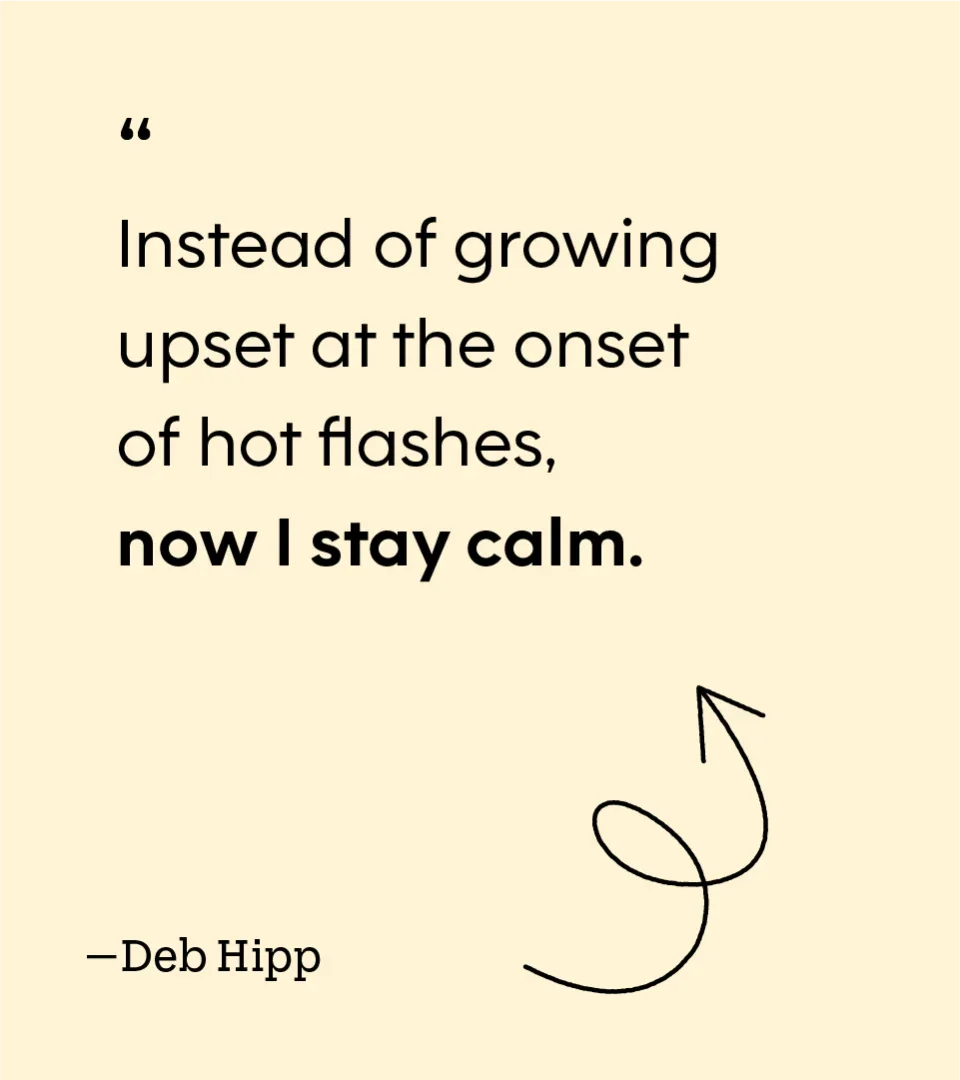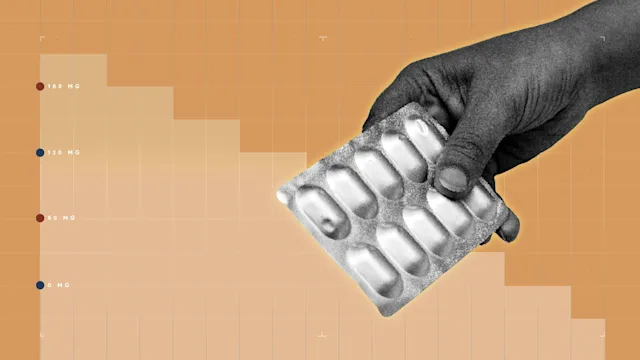Key takeaways:
Deb Hipp’s menopausal hot flashes were frequent and severe, disrupting her sleep, work, and social life.
Hormone replacement therapy (HRT) stopped the hot flashes, but they returned after a medical emergency made her stop HRT.
Mindfulness and yoga were key factors in reducing the number and frequency of Deb's hot flashes.
This morning, I grabbed a glass of ice water, cranked up a small desktop fan, and waited for my latest postmenopausal hot flash to pass. By now, I know what to expect. With a mild hot flash, I sweat a bit for a minute or so, then the flush of heat passes. With a severe hot flash, I’m drenched in sweat, and I have to wipe the sweat from my face with a towel.
After the hot flash, chills begin and last about a minute. More than 10 years after my hot flashes began when I was 50 years old, they’re back again. Hormone replacement therapy (HRT) in my 50s stopped them completely. Then I had to quit HRT 2 years ago because of a medical emergency.
Research indicates that 3 out of 4 women may experience menopausal hot flashes. The flashes can occur before, during and after menopause for up to 10 years or longer. The frequency and severity vary, however. My hot flashes were brutal, but that’s not the case for many women.
The postmenopausal hot flashes I have now aren’t as bad as they were during menopause. And this time, I’m proactive at finding ways to keep hot flashes at bay and reduce their severity.
Firing up the internal furnace
Ten years ago, my first menopausal hot flash symptoms were barely noticeable. Sometimes a crowded room seemed too warm. A blouse suddenly felt too tight. A month after those first times of feeling uncomfortably warm, however, full-blown hot flashes kicked in.
I had multiple hot flashes daily. There was no mistaking the feeling of warmth in my face and head before a hot flash. But that only lasted a few seconds. Soon, my body heat would rise from the inside like someone fanned the flames of an internal potbelly stove. My face, neck and chest turned red. I was immediately covered in sweat all over my upper body, face, and hair.
“Are you OK?” a friend asked at lunch one day, while I tried to hide my intense hot flash. When I trained a new person at work for a week, I had multiple, severe hot flashes all day long. I stopped socializing because of hot flash embarrassment. I couldn’t wear sweaters. I woke up with night sweats that soaked the sheets.
Exercise can help with hot flashes. But even though I worked out at the gym several times a week, my hot flashes remained frequent and severe. One day, I kept a log of every hot flash. I recorded intense hot flashes at least every half-hour. That’s around 30 hot flashes a day — all before bedtime.
I toughed it out for nearly 2 years because of the potential risks associated with long-term use of hormone replacement therapy (HRT), including breast cancer, heart disease, stroke and blood clots. Finally, I decided my quality of life outweighed the risks of HRT. I asked my OB/GYN to prescribe HRT medication to raise my estrogen levels. She prescribed me Prempro (conjugated estrogens / medroxyprogesterone), which raises the risk of blood clots.
What does a hot flash feel like? Read about women who say it feels like heat that creeps up your back.
How do you get rid of hot flashes? Natural remedies include dietary and lifestyle changes and supplements.
What can bring relief for menopause symptoms? Mind-body treatments — such as yoga, relaxation exercises, cognitive behavioral therapy, and hypnosis — can help.
Within a few weeks, my hot flashes went away completely. I unpacked my stored sweaters. I slept better and had more energy. I enjoyed my life again for several years. Then a couple of years ago, I developed a superficial blood clot on the inside of my right thigh. I needed to stop HRT, my OB/GYN told me. And then my hot flash ordeal started all over again.
Combining medication and mindfulness
This time around, sheet-soaking night sweats woke me up every hour, every night for 2 months. I could barely work because I was so sleep-deprived. Daytime hot flashes weren’t as frequent as before. But I still had at least 10 a day. This time, however, I took a more proactive approach.


I tried taking black cohosh supplements, then later, magnesium, with no changes in hot flash frequency or intensity. My OB/GYN prescribed the antidepressant duloxetine (Cymbalta), which helped a bit. Later, she added gabapentin (Neurontin), which helped reduce the night sweats to only one or two a night. I also took steps to reduce hot flashes naturally.
- Vivelle-DotDotti and Estradiol
- ClimaraEstradiol
- DivigelEstradiol
I started paying attention to what I was doing immediately prior to a hot flash. Sometimes, they just happen. Other times, the flashes follow an annoying experience, such as trying to get claims information from my health insurance company, or work-related frustration. The more upset I get when the hot flash starts, the more severe the flushes.
So, instead of growing upset at the onset of hot flashes, now I stay calm. If it’s a night sweat, I acknowledge it, move the covers aside, let the flush pass, and go back to sleep. If I have a hot flash while working at home, I sip ice water and turn on my desk fan. Sometimes, I toss off my shirt until it passes. Staying calm helps reduce the frequency and severity of my hot flashes.
I also added yoga to my fitness routine. The physical activity, breathwork, and mindfulness of yoga help me feel less stressed and more centered. For the first year, I’d have at least one hot flash during a yoga class. But eventually, I didn’t have any while doing yoga. I began to sleep better, too, since the night sweats were fewer.
In addition to yoga and working out at the gym, I stay away from hot flash triggers, such as eating spicy foods, fried foods, and sweets. I limit my alcoholic drinks. I let things that annoy me roll off, choosing calm instead of irritation. My body seems to be adjusting better to lower estrogen levels. But the hot flashes haven’t gone away completely.
Getting hot flashes under control
These days, I still have a few hot flashes during the day. I might wake up once, maybe twice, at night with a hot flash. But they’re milder and pass quickly. I’d rather not have any hot flashes. Still, I can live with them now that they’re fewer and less severe. Hopefully, their frequency and severity will lessen over time. Meanwhile, exercising and eating vegetables, fruits and low-fat meats helps.
It’s hard to keep a cool head during a hot flash. But this time around, I realize I’m not powerless. The better I treat my body and mind, the less likely my day is to go up in flames.

Why trust our experts?

















